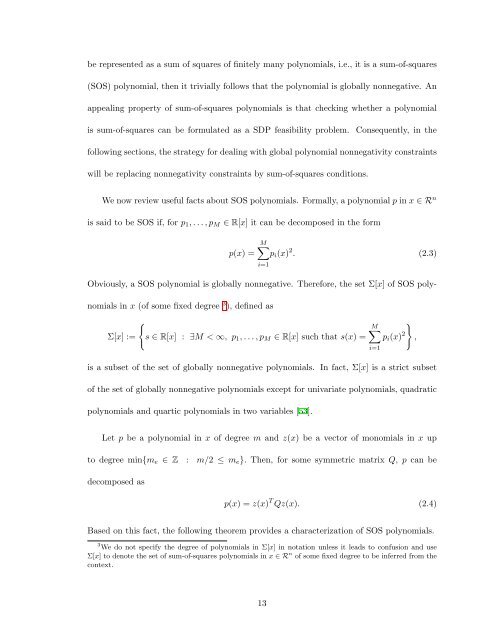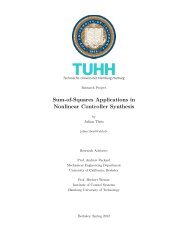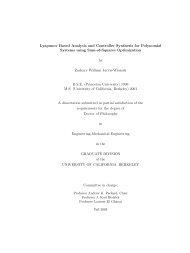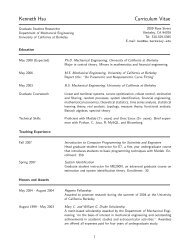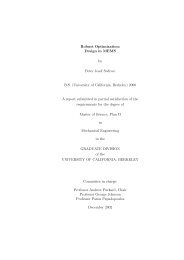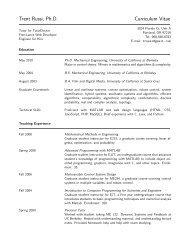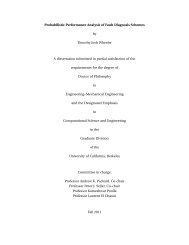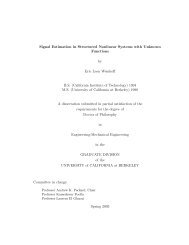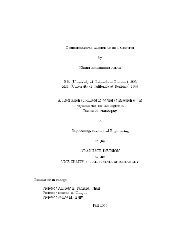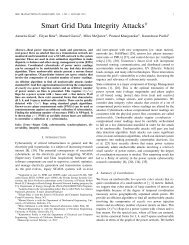Quantitative Local Analysis of Nonlinear Systems - University of ...
Quantitative Local Analysis of Nonlinear Systems - University of ...
Quantitative Local Analysis of Nonlinear Systems - University of ...
You also want an ePaper? Increase the reach of your titles
YUMPU automatically turns print PDFs into web optimized ePapers that Google loves.
e represented as a sum <strong>of</strong> squares <strong>of</strong> finitely many polynomials, i.e., it is a sum-<strong>of</strong>-squares<br />
(SOS) polynomial, then it trivially follows that the polynomial is globally nonnegative. An<br />
appealing property <strong>of</strong> sum-<strong>of</strong>-squares polynomials is that checking whether a polynomial<br />
is sum-<strong>of</strong>-squares can be formulated as a SDP feasibility problem. Consequently, in the<br />
following sections, the strategy for dealing with global polynomial nonnegativity constraints<br />
will be replacing nonnegativity constraints by sum-<strong>of</strong>-squares conditions.<br />
We now review useful facts about SOS polynomials. Formally, a polynomial p in x ∈ R n<br />
is said to be SOS if, for p 1 , . . . , p M ∈ R[x] it can be decomposed in the form<br />
p(x) =<br />
M∑<br />
p i (x) 2 . (2.3)<br />
i=1<br />
Obviously, a SOS polynomial is globally nonnegative. Therefore, the set Σ[x] <strong>of</strong> SOS polynomials<br />
in x (<strong>of</strong> some fixed degree 3 ), defined as<br />
{<br />
Σ[x] := s ∈ R[x] : ∃M < ∞, p 1 , . . . , p M ∈ R[x] such that s(x) =<br />
}<br />
M∑<br />
p i (x) 2 ,<br />
i=1<br />
is a subset <strong>of</strong> the set <strong>of</strong> globally nonnegative polynomials. In fact, Σ[x] is a strict subset<br />
<strong>of</strong> the set <strong>of</strong> globally nonnegative polynomials except for univariate polynomials, quadratic<br />
polynomials and quartic polynomials in two variables [53].<br />
Let p be a polynomial in x <strong>of</strong> degree m and z(x) be a vector <strong>of</strong> monomials in x up<br />
to degree min{m e ∈ Z : m/2 ≤ m e }. Then, for some symmetric matrix Q, p can be<br />
decomposed as<br />
p(x) = z(x) T Qz(x). (2.4)<br />
Based on this fact, the following theorem provides a characterization <strong>of</strong> SOS polynomials.<br />
3 We do not specify the degree <strong>of</strong> polynomials in Σ[x] in notation unless it leads to confusion and use<br />
Σ[x] to denote the set <strong>of</strong> sum-<strong>of</strong>-squares polynomials in x ∈ R n <strong>of</strong> some fixed degree to be inferred from the<br />
context.<br />
13


